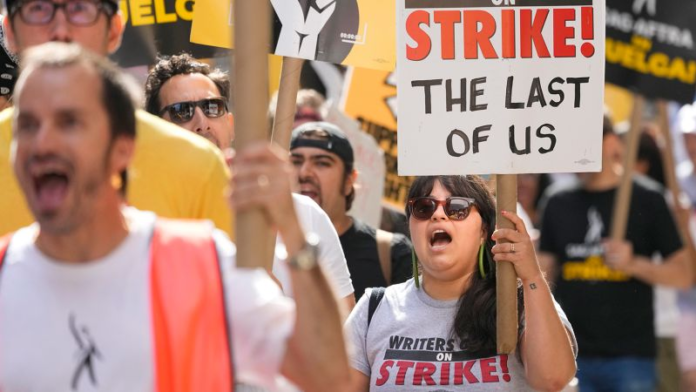Editor’s Note: A version of this article first appeared in the “Reliable Sources” newsletter. Sign up for the daily digest chronicling the evolving media landscape here.
CNN —
Summer is coming to a close, but Hollywood is still stuck in strike Hell.
In the nearly four months since the Writers Guild of America, West, went on strike, television schedules have been shaken up, movies and shows have been bumped, once-glamorous red carpets have gone dark, and the laughter of late-night has died.
A few weeks ago, when the pain of the enduring stalemate began to cause a wince, studios moved to reinitiate talks with the writers, eliciting a sense of cautious optimism in Tinseltown. It seemed that after an exhausting summer, rife with endless hours of picketing and rhetoric fueled by inflamed passions, hope was on the horizon.
But those glimmers of hope for an elusive agreement turned out to be a mirage. Now, on the precipice of Labor Day Weekend, a deal is nowhere in sight. Schools are starting back up, the weather is cooling, but Hollywood remains enmeshed in a labor dispute for the ages.
Studio executives believe they have made strong efforts in recent weeks to end the standstill. Represented by the AMPTP, the studios delivered to the writers terms that they had hoped could be the starting point for a negotiation that would ultimately lead to an agreement. But they were deeply mistaken. The writers, represented by the WGA, scoffed at the offer. For them, it was grossly insufficient on a number of fronts.
From there, the AMPTP tried appealing directly to members of the WGA by publicly releasing the terms of their offer. Perhaps, they had hoped, when the WGA membership base saw the offer for themselves, it would lead to a mutiny that could tilt the scales in their favor. The bold move signaled how confident the studios were in the offer they had put on the table.
But it did little, if anything, to move the needle. Instead, it earned the studios yet another scolding from guild negotiators who ripped the studios for attempting to bypass them.
“Despite the AMPTP’s attempt at a detour around us, we remain committed to direct negotiations with the companies,” the WGA said last week in a note to members. “That’s actually how a deal gets made and the strike ends. That will be good for the rest of the industry and the companies as well.”
The guild might be committed to direct negotiations, but direct negotiations are not happening. Instead, the two sides are once again playing a game of chicken, waiting for the other side to make the first move. Each side firmly believes the ball is in the other party’s court. The negotiations are in such despair that the two sides cannot even agree on the basic state of play.
“It’s a waiting game,” one studio executive told me Thursday.
That game of chicken is about to get a lot more serious after Labor Day. The window for a deal that saves the winter season of production and gets cameras rolling once again is quickly closing. And panic is starting to seep in on both sides of the equation. As the studio executive I spoke to said, the possibility of a winter season “just evaporates” if the strikes aren’t resolved within the next several weeks. And if there is no winter season, there would be little work on television productions until the new year, with or without a deal.
The protracted stalemate — now headed for record territory — raises the real possibility that Hollywood production will remain frozen for many months. That would mean that writers and the many others who depend on the hum of the Hollywood engine to make ends meet, could have to make it through the holidays without work. A summer of picketing will give way to a winter of cold anguish. Bank accounts of the striking scribes are quickly shrinking, film and television show plans are being further imperiled, and California’s massive economy is taking a blow.
A failure to strike a deal soon after Labor Day is not a foregone conclusion, by any means. A breakthrough can happen at any point in time. Both the writers and studios do share one common belief: that the strike has gone on too long. But, at this moment, there isn’t yet a light at the end of the tunnel. And if it’s not resolved in short order, it will be a dark winter for the industry.


